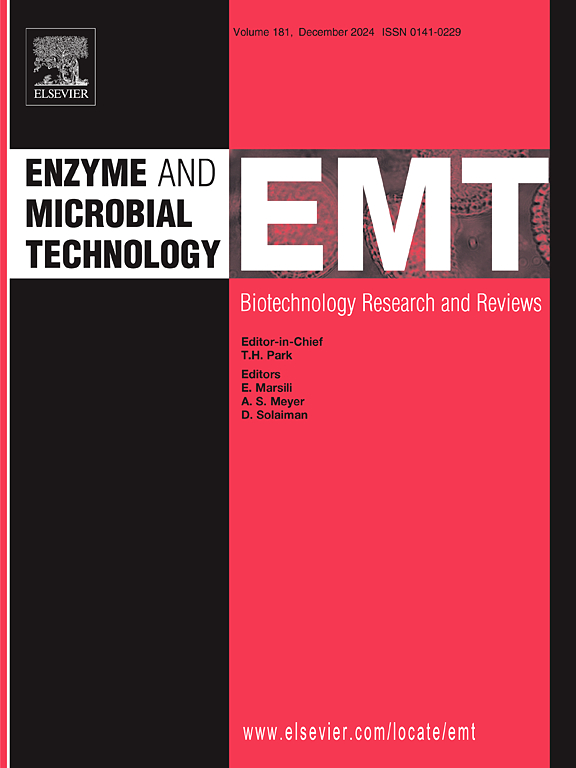利用以基因组为中心和专利驱动的探索揭示六种新型 CALB 类脂肪酶
IF 3.4
3区 生物学
Q2 BIOTECHNOLOGY & APPLIED MICROBIOLOGY
引用次数: 0
摘要
由于脂肪酶能够进行多种生化反应,因此在各种工业领域都有生物技术应用。然而,除了涉及脂肪酶的大量专利外,高昂的成本有时也阻碍了它们的潜在用途。利用和研究最多的脂肪酶之一是白色念珠菌脂肪酶 B(CALB),它以多功能性著称,包括对映体选择性、热稳定性和广泛的底物范围。因此,寻找新的类 CALB 脂肪酶是实现生物催化剂的一个有趣策略,尤其是在包含知识产权分析的情况下。本研究发现并生产了六种没有专利保护的类 CALB 酶,它们在口袋氨基酸和底物特异性方面存在差异。我们在近 7000 个真菌基因组中进行了基因组搜索,发现了 1500 多个独特的 CALB 同源物候选者。通过系统发育和知识产权分析,我们筛选出了一些与 CALB 非常相似的未受保护序列。其中一种克隆的脂肪酶在口袋入口处的疏水性较低,偏好以 C4 对硝基苯酯为底物。另一种脂肪酶的口袋开口更宽,极性更强,但没有显示出偏好性。这些结果发现了新的无专利脂肪酶,它们具有保守的基本催化元件,但由于催化袋的变化而具有不同的底物特异性。这些酶可以作为生物催化剂创新的起点,在不同的生物技术领域具有潜在的应用价值。本文章由计算机程序翻译,如有差异,请以英文原文为准。
Unveiling six novel CALB-like lipases using genome-centric and patent-driven prospection
Lipases present biotechnological applications in various industrial sectors due to their ability to perform multiple biochemical reactions. However, the high cost sometimes discourages their potential uses, besides the extensive number of patents involving them. One of the most utilized and researched lipases is Candida antarctica lipase B (CALB), known for its versatility, encompassing enantioselectivity, thermostability, and a wide range of substrates. Therefore, finding new CALB-like lipases is an interesting strategy to enable the implementation of biocatalysts, especially if intellectual property analysis is included. The present study identified and produced six CALB-like enzymes without patent protection, with differences in pocket amino acids and substrate specificity. We conducted genomic searches in almost 7000 Fungal genomes, identifying over 1500 unique CALB homolog candidates. The phylogenetic and intellectual property analysis filtered those results into a few sequences without protection that were very similar to CALB. One cloned lipase had a lower hydrophobicity at the pocket entrance and preferred the C4 p-nitrophenyl ester as substrate. Another had a wider opening and more polar pocket, showing no preference. These results identified new patent-free lipases with conserved essential catalytic elements and diverse substrate specificity due to variations in the catalytic pocket. These enzymes can be the starting point for biocatalyst innovation with potential applications in diverse biotechnological areas.
求助全文
通过发布文献求助,成功后即可免费获取论文全文。
去求助
来源期刊

Enzyme and Microbial Technology
生物-生物工程与应用微生物
CiteScore
7.60
自引率
5.90%
发文量
142
审稿时长
38 days
期刊介绍:
Enzyme and Microbial Technology is an international, peer-reviewed journal publishing original research and reviews, of biotechnological significance and novelty, on basic and applied aspects of the science and technology of processes involving the use of enzymes, micro-organisms, animal cells and plant cells.
We especially encourage submissions on:
Biocatalysis and the use of Directed Evolution in Synthetic Biology and Biotechnology
Biotechnological Production of New Bioactive Molecules, Biomaterials, Biopharmaceuticals, and Biofuels
New Imaging Techniques and Biosensors, especially as applicable to Healthcare and Systems Biology
New Biotechnological Approaches in Genomics, Proteomics and Metabolomics
Metabolic Engineering, Biomolecular Engineering and Nanobiotechnology
Manuscripts which report isolation, purification, immobilization or utilization of organisms or enzymes which are already well-described in the literature are not suitable for publication in EMT, unless their primary purpose is to report significant new findings or approaches which are of broad biotechnological importance. Similarly, manuscripts which report optimization studies on well-established processes are inappropriate. EMT does not accept papers dealing with mathematical modeling unless they report significant, new experimental data.
 求助内容:
求助内容: 应助结果提醒方式:
应助结果提醒方式:


